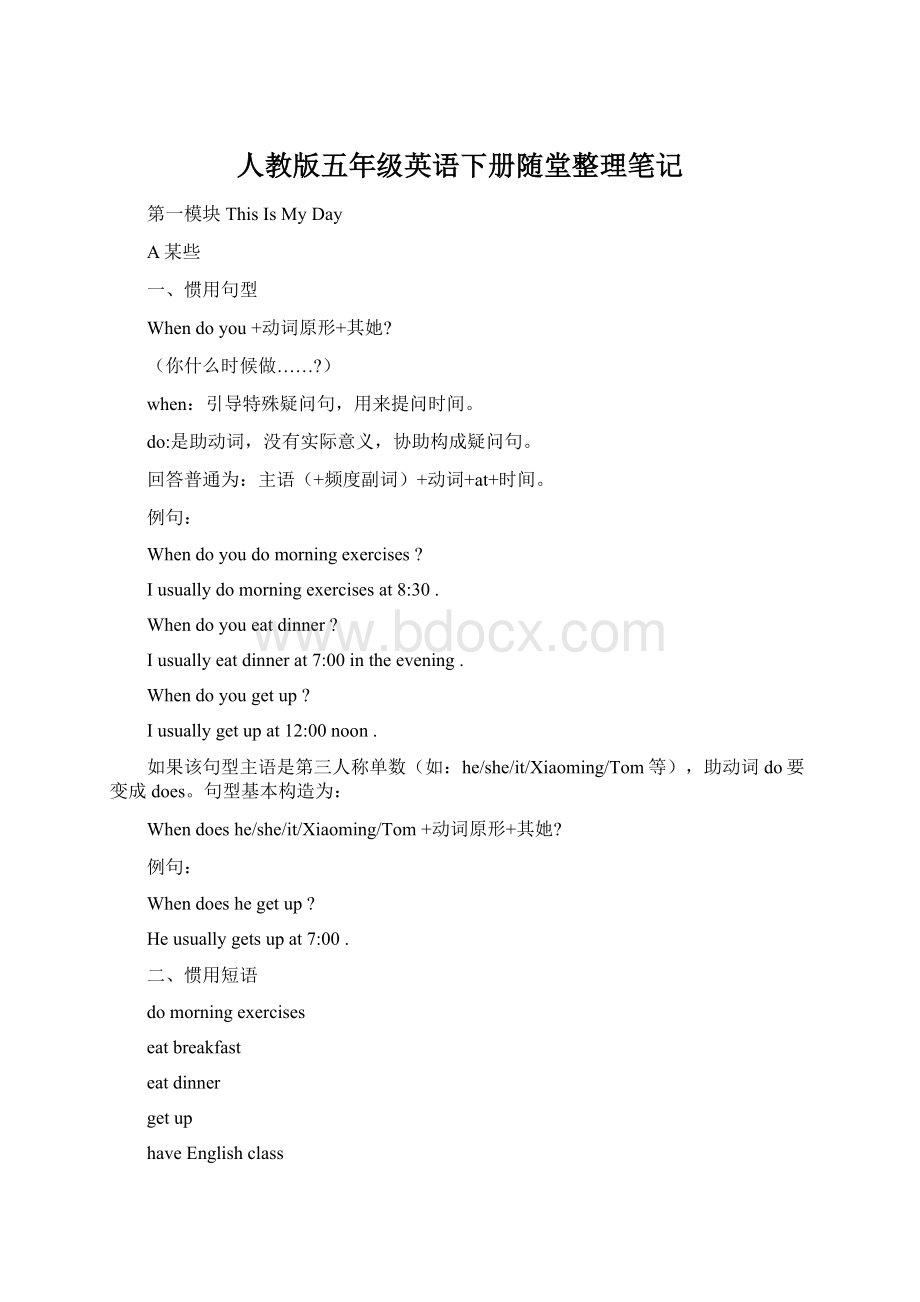人教版五年级英语下册随堂整理笔记.docx
《人教版五年级英语下册随堂整理笔记.docx》由会员分享,可在线阅读,更多相关《人教版五年级英语下册随堂整理笔记.docx(15页珍藏版)》请在冰豆网上搜索。

人教版五年级英语下册随堂整理笔记
第一模块ThisIsMyDay
A某些
一、惯用句型
Whendoyou+动词原形+其她?
(你什么时候做……?
)
when:
引导特殊疑问句,用来提问时间。
do:
是助动词,没有实际意义,协助构成疑问句。
回答普通为:
主语(+频度副词)+动词+at+时间。
例句:
Whendoyoudomorningexercises?
Iusuallydomorningexercisesat8:
30.
Whendoyoueatdinner?
Iusuallyeatdinnerat7:
00intheevening.
Whendoyougetup?
Iusuallygetupat12:
00noon.
如果该句型主语是第三人称单数(如:
he/she/it/Xiaoming/Tom等),助动词do要变成does。
句型基本构造为:
Whendoeshe/she/it/Xiaoming/Tom+动词原形+其她?
例句:
Whendoeshegetup?
Heusuallygetsupat7:
00.
二、惯用短语
domorningexercises
eatbreakfast
eatdinner
getup
haveEnglishclass
playsports
ontheweekend
inthemorning/evening
Whataboutyou?
CanIaskyousomequestions?
Lookhere!
Thisismyweekendtimetable.
It’sgreat.
goswimming
goshopping
gotoschool
gotowork
gotobed
gohome
excuseme
Iamsorry.
SometimesIclimbmountains.
playthepiano
visitgrandparents
watchvideos
Whatdoyoudo?
Tellusaboutyourday!
Thankyoufortellingmeaboutyourday.
You’rewelcome.
三、单词
whenusuallyoftenatabouttoodayaskworkeveningnoontellpolicemansomesure
四、普通当前时
普通当前时表达当前经常发生动作、行为或存在状态等。
普通当前时经常与often、usually、sometimes等词连用。
其重要形式有两大类:
一是具有be动词句子;二是具有实义动词句子。
一、必定句
1、主语(非第三人称单数)+动词原形+其她
例句:
Idomyhomeworkeveryevening.
2、主语(第三人称单数)+动词第三人称单数形式+其她
例句:
Shedoesmorningexerciseseverymorning.
二、否定句
1、主语(非第三人称单数)+don’t+动词原形+其她
例句:
Idon’tlikeapples.
2、主语(第三人称单数)+doesn’t+动词原形+其她
例句:
Tomdoesn’twatchTVonMondays.
三、普通疑问句
1、Do+主语(非第三人称单数)+动词原形+其她
例句:
Doyoulikeapples?
2、Does+主语(第三人称单数)+动词原形+其她
例句:
DoesyourmotherspeakEnglish?
四、特殊疑问句
1、特殊疑问词+do+主语(非第三人称单数)+动词原形+其她
例句:
Whatdoyoulike?
2、特殊疑问词+does+主语(第三人称单数)+动词原形+其她
例句:
Wheredoeshelive?
五、关于“Whatabout……”句型
Whataboutyou?
Whataboutthisbook?
Whataboutrunning?
B某些
一、惯用句型
Whatdoyoudoontheweekend?
Ioften/usually……
如果主语是第三人称单数(如:
he/she/it/Xiaoming/Tom等),助动词do要变成does。
句型基本构造为:
Whatdoeshe/she/itdoontheweekend?
He/She/Itoften+动词第三人称单数形式……
二、惯用短语
climbmountains
goshopping
gohiking
playthepiano
visitgrandparents
Howaboutyou?
Whataboutyou?
Andyou?
readbooks
dohomework
cleanmyroom
watchTV
Let’sgohikingtogethernextSunday.
playwith……
That’sfun.
Butnotthisweekend.
Theweatherreportsaysit’sgoingtoraintomorrow.
intherain
Thencometomyhome.
三、单词
weekendofteneveryreadsometimesnexttogetherwiththenrainfunwhysayeithertheiractivityrole
四、“too”和“either”区别
“too”和“either”均有“也”意思,但用法不同,too用在必定句中,either用在否定句中。
例如:
Ilikeapples,too.
Ican’tgohiking,either.
五、小知识
a.m.指上午。
如:
6:
00a.m.8:
30a.m.
p.m.指下午。
如:
2:
00p.m.4:
30p.m.
noon仅指中午12:
00。
如:
12:
00noon
C某些
一、惯用短语
Nicetomeetyou.
inthemorning/afternoon/evening
atnoon/night
IamAmy’sfather.
Thankyoufortellingmeaboutyourday.
Classesbeginat8:
00.
eatbreakfast/lunch/dinner
Circleherweekendactivities.
goout
inthepark
Let’splayfootballorbasketball.
playinthesun
Igowithhimeverywhere.
IbarkatMike.
wakeup
It’slate.
HowcanIhelphim?
searchfor……
comeon/hurryup
dependon
Hecanalwaysdependonme.
二、单词
busygrouptodaygrassglasstrainMaygrowgladgluegloveherbegincirclerulefollowbeforemealbrushtoothearlyparkorsunbasketballeverywheresingbarkwakelatehimsearchalways
三、小知识
Rulestofolloweveryday
Cleanyourhandsbeforemeals.
Playsportseveryday.
Brushyourteethbeforeyougotobed.
Gotobedearly.
第二模块MyFavouriteSeason
一、惯用句型
What’s+one’s+favouriteseason?
One’sfavouriteseasonis+季节.
例句:
What’syourfavouriteseason?
Myfavouriteseasonisspring/summer/fall/winter.
Whichseasondoyoulikebest?
Ilikespring/summer/fall/winterbest.
如果主语为第三人称单数,问句中助动词“do”要变成“does”,答句中动词要用第三人称单数形式,例如:
Whichseasondoeshe/she/yourmotherlikebest?
He/Shelikesspring/summer/fall/winterbest.
询问天气句型:
What’stheweatherlikeinspring?
It’ssunnyandwarm.
Summerisgood,butfallismyfavouriteseason.
Whydoyoulikesummer?
BecauseIcanswiminthelake.
如果主语为第三人称单数,问句中助动词“do”要变成“does”,答句中动词要用第三人称单数形式,例如:
Whydoeshe/she/it/yourmotherlikewinter?
Becausehe/shecansleepalongtime.
Whatwouldyouliketodo?
I’dliketoflykites.Whataboutyou?
I’dliketohaveapicnic.
WhenisthebesttimetogotoBeijing?
Spring.
第三模块MyBirthday
一、惯用句型
Whenisone,sbirthday?
One,sbirthdayisin+月份.
例如:
Whenisyourbirthday?
MybirthdayisinNovember.
Isone,sbirthdayin+月份?
Yes./No,one,sbirthdayisin+月份.
例如:
IsyourbirthdayinMarch,too?
No,mybirthdayisinMay.
Howmany+可数名词复数+arethere+其他?
例如:
HowmanybirthdaysarethereinJanuary?
询问详细日期句型构造为:
What,sthedate?
It,s+月份+序数词。
例如:
What,sthedatetoday?
It,sJune5th.
二、惯用短语
inJanuary
Whataboutyou?
mymother,sbirthday
myfather,sbirthday
mypartner,sbirthday
UncleBill,sbirthday
AuntMary,sbirthday
CousinAlice,sbirthday
send……ane-card
be(am/is/are)ableto
Goodidea!
三、单词
JanuaryFebruaryMarchAprilMayJuneJulyAugustSeptemberOctoberNovemberDecemberbirthdayspringsummerfallwinterunclecousinfirstsecondthirdfourthfifthsixthseventheighthninthtentheleventhtwelfthtwentiethhertheneveryone
四、节日
NewYear,sDay(元旦:
1月1日)
Women,sDay(妇女节:
3月8日)
Tree-plantingDay(植树节:
3月12日)
Children,sDay(小朋友节:
6月1日)
ArmyDay(建军节:
8月1日)
Teachers,Day(教师节:
9月10日)
NationalDay(国庆节:
10月1日)
ChristmasDay(圣诞节:
12月25日)
五、名词所有格
在名词背面加“,s”或“,”,来表达所属关系,这种构造称为名词所有格。
翻译为“…….”。
它有两种状况:
(一)如果是单数名词,在词尾加“,s”。
例如:
Tom,s、John,s、Xiaoming,s等。
(二)如果是以“s”结尾复数名词,只在词尾加“,”。
例如:
Teachers,Day;boys,;girls,
六、序数词
表达顺序词是序数词,它是由基数词变化而来,前面普通要加“the”或“物主代词”。
(一)序数词除了“first”、“second”、“third”外,别的都是由基数词加“th”构成,但要注意四个特殊变化序数词:
five---fifth,eight---eighth,nine---ninth,twelve---twelfth
(二)以“ty”结尾整十基数词变为序数词时,先把y变为ie,再加th。
如:
twenty---twentieth;thirty---thirtieth。
(三)从“二十一”开始,表达几十几基数词变为序数词时,十位数仍用基数词,个位数用序数词,中间用“-”连字符。
例如:
twenty-first。
(四)缩写序数词时,由阿拉伯数字加该序数词后两个字母构成。
例如:
first---1st,eighth---8th,twenty-fifth---25th
基数词
序数词
one
first
two
second
three
third
four
fourth
five
fifth
six
sixth
seven
seventh
eight
eighth
nine
ninth
ten
tenth
eleven
eleventh
twelve
twelfth
thirteen
thirteenth
fourteen
fourteenth
……
……
twenty
twentieth
twenty-one
twenty-first
……
……
六、详细日期英文表达
“June4th”就是详细日期英文表达。
在英语中,“几月几日”要先说“月”,再说“日”,其中“日”要用序数词。
读时要在序数词前面加“the”。
“June4th”读作“Junethefourth”。
第四模块WhatAreYouDoing?
一、惯用句型
当前进行时特殊疑问句:
What+be动词+主语+doing?
主语+be动词+当前分词+其她
例如:
Whatareyoudoing?
I’mansweringthephone.
Whatishedoing?
He’sdrawingpictures.
如何在电话中自我简介
Thisis……
Itis……
如何在电话中询问对方是谁
Isthat……?
CanIspeaktoyourmom,please?
Whatisshedoing?
How’severybodydoing?
Justfine.
Who’sthat?
二、惯用短语
ThisisZhangPeng.
It’sZhangPeng.
inthestudy
dothedishes
readabook
drawpictures
cookdinner
answerthephone
writealetter
writeane-mail
dohomework
inthekitchen
listentomusic
Holdon,please.(Pleaseholdon)
Iamtalkingtoyou.
DoyouwanttogototheChildren’sCenter?
Whattime?
Seeyoulater.
washtheclothes
cleantheroom
Now,everybody.Doanaction.
readthenewspaper
Thereisacallforyou.
Whataboutyourdad?
I’mcoming.
三、惯用单词
everybodyactiongrandpastudytrain
第五模块LookattheMonkeys
一、惯用句型
当前进行时特殊疑问句:
询问她人正在做什么句型构造:
(一)What+is+主语(第三人称单数)+doing?
主语(第三人称单数)+is+当前分词+其他.
例如:
WhatisAmydoing?
Sheisreadingabook.
(二)What+are+主语(you或复数名词)+doing?
I,m+当前分词+其他.
We,re/They,re+当前分词+其他.
例如:
Whatareyoudoing?
I’m/We,reansweringthephone.
Whatareelephantsdoing?
They,rewalkinging.
二、惯用短语
Thatbabykangarooissocute.
Whataboutthemotherkangaroo?
drinkwaterwithitstrunk
lookthere
Duckscan,tfly.
Whatabignaturepark!
climbtrees
They,regoodclimbers.
三、当前分词变化规则
动词加上ing就变成了当前分词
状况
变化规律
例词
普通状况
直接加ing
play---playing
以不发音字母e结尾
先去掉e,再加ing
take---taking
write---writing
以单个辅音字母结尾重读闭音节词
先双写这个辅音字母,再加ing
run---running
stop---stopping
swim---swimming
以ie结尾
先把ie改为y,再加ing
lie---lying
die---dying
四、some和any区别
some和any都是“某些”意思,背面都可以跟可数名词、不可数名词。
some用在必定句中,any用在否定句和疑问句中。
五、“what”引导感叹句
“what”在这里引导感叹句,意思为“多么”,用来修饰名词。
句型为:
What+a/an+形容词+可数名词单数(+主语+谓语)!
或:
What+形容词+不可数名词/名词复数(+主语+谓语)!
例如:
Whatabignaturepark!
Whatanoldwomansheis!
Whatdeliciousfood!
六、单词
flywalkjumprunswimkangaroosleepclimbfightswing
trunkduckelephanttigermonkeyclimbernature
第六模块AFieldTrip
一、当前进行时普通疑问句:
(一)主语是第三人称单数
Is+he/she/it(第三人称单数)+当前分词+其他?
Yes,he/she/it+is.
No,he/she/it+isn,t.
例如:
IsTomreadingabook?
Yes,heis./No,heisn,t.
(二)主语是第二人称或复数名词
Are+you/we/they(第二人称或复数名词)+当前分词+其他?
Yes,Iam.或者:
Yes,we/theyare.
No,Iamnot.或者:
No,we/theyaren,t.
例如:
Areyoueatinglunch?
Yes,Iam./Yes,weare.
No,Iamnot./No,wearen,t.
Aretheelephantswalking?
Yes,theyare./No,theyaren,t.
二、惯用短语
takepictures
watchinsects
countinsects
watchclassmates
pickupleaves
collectleaves
doanexperiment
catchbutterflies
writeareport
writeane-mail
playchess
haveapicnic
havealookat……
Let,sgoonafieldtrip.
eatlunch
Wherearethey?
Whatdoantsliketoeat?
inthewoods
That’sinteresting.
eatvegetable
It’stimetogo.
It’stimeto……
Tellhimwe’releaving.
She’srunningtous.
overthere
三、单词
leafleavebutterflyexperimentinsectwoodshoney
antinterestingthing